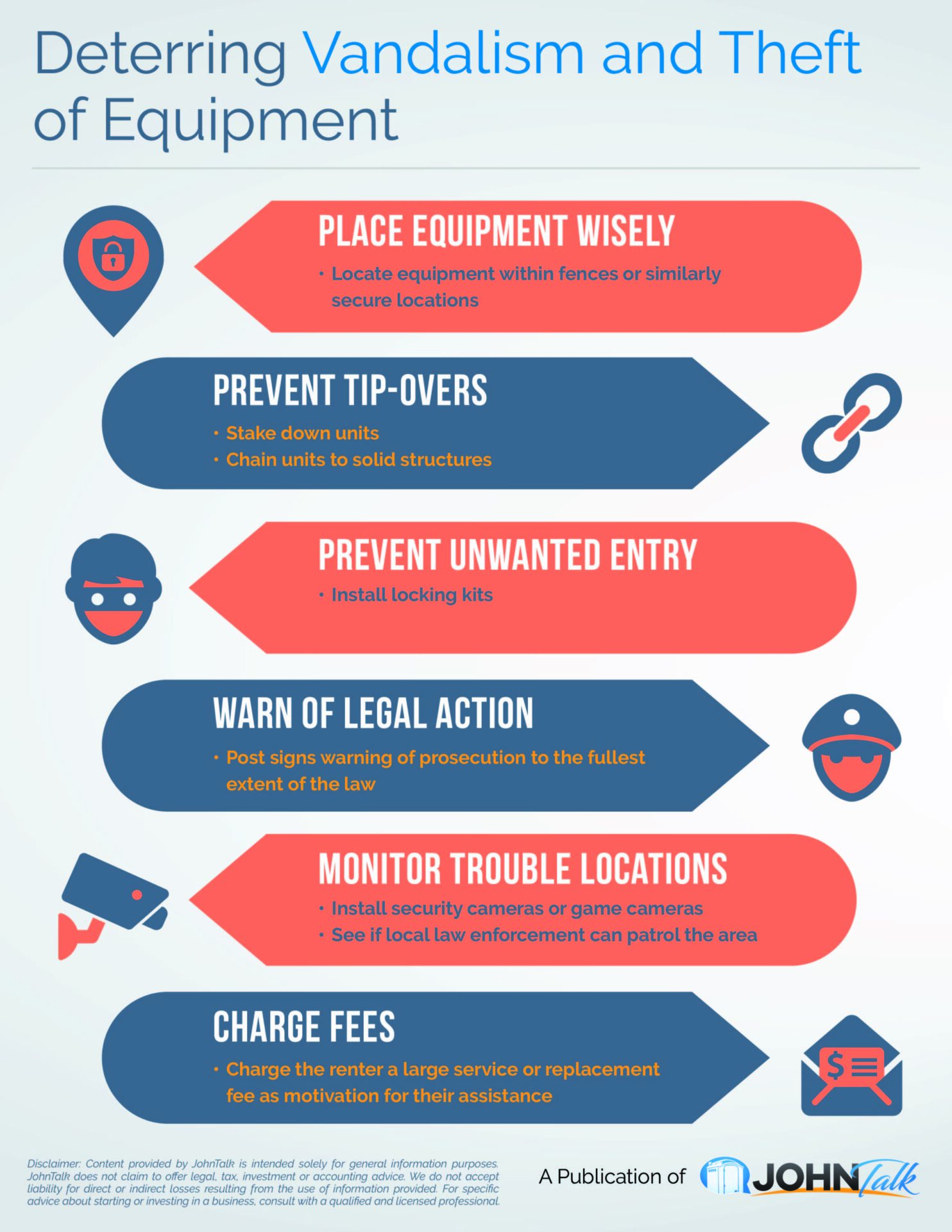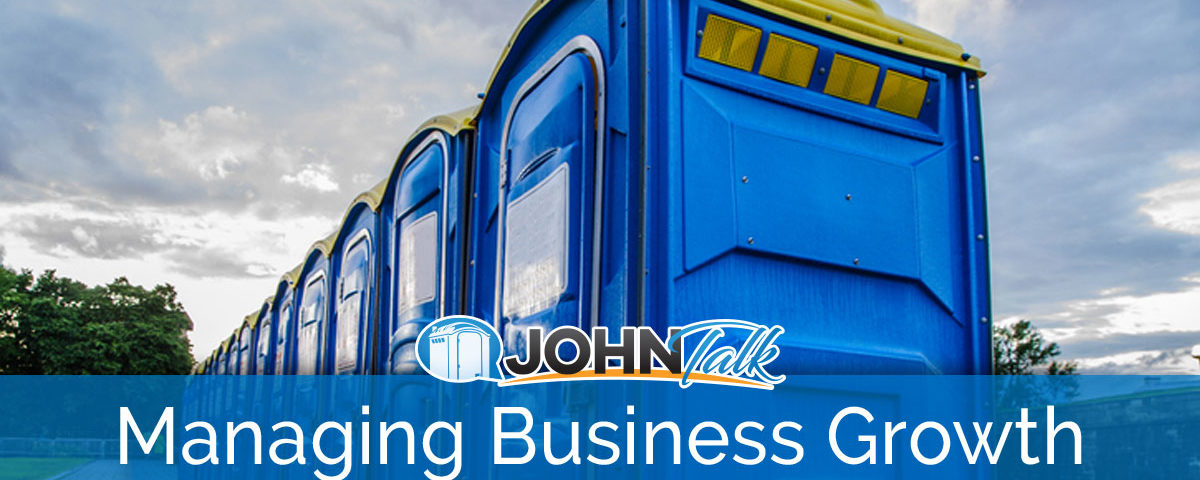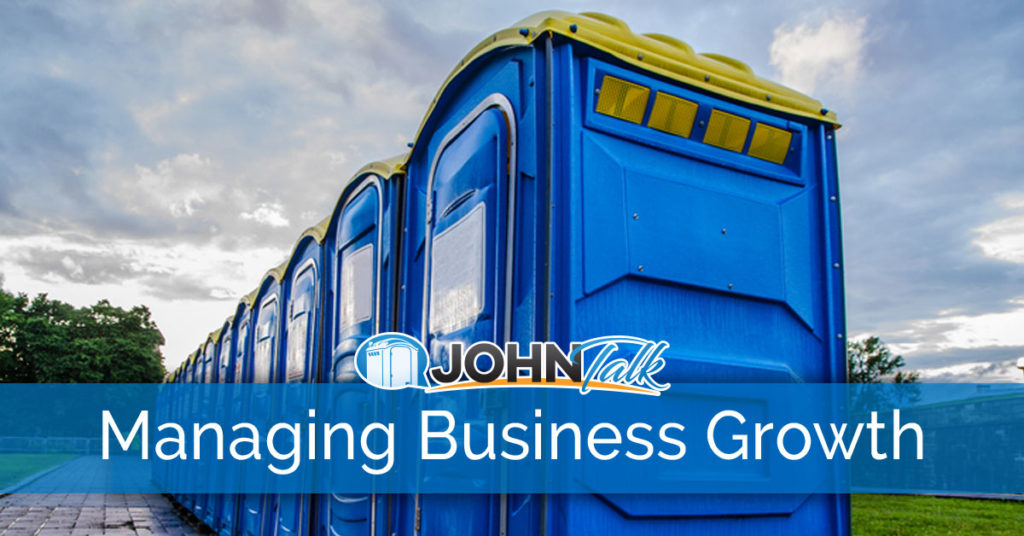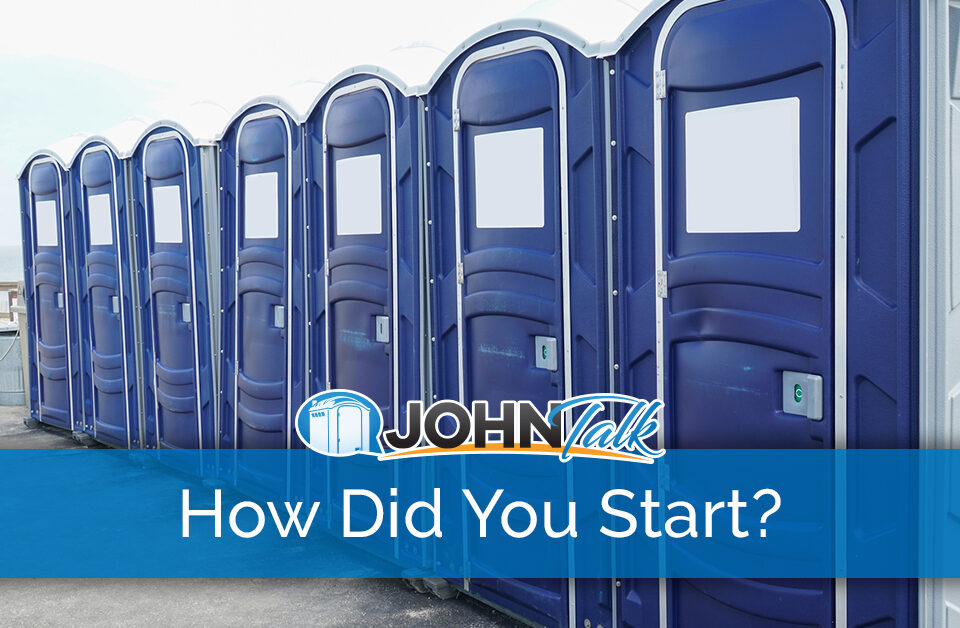
INFOGRAPHIC: Deterring Vandalism and Theft of Equipment
January 20, 2020
Ways to Ensure Timely Customer Payments
February 3, 2020Many portable sanitation businesses have been booming recently, taking advantage of our robust economy. Fast growth is great, right?
Not so fast! Sometimes, it can actually harm your business.
Of course, growth is what you need to make that new business of yours profitable. There are many ways a business can grow, such as expanding into new markets or merging with or acquiring other businesses. But we’re talking about the most basic type of growth, which is often called organic growth. It means you are increasing your “output” – your sales and service. It means you’re servicing more customers and perhaps offering more products.
Businesses can grow slowly or rapidly. The potential problem is not the growth itself, but how you manage it. A growing business is your goal, but unchecked growth, which means growth that isn’t properly managed, can be a danger to your business in many ways.
The potential hazards of business growth, especially fast growth, are real. The examples below are worst-case scenarios that can happen.
Customer service suffers
You’re so busy that you’re late delivering units. A worker on overtime or hurrying through the route may not clean as thoroughly as usual or forget that extra roll of toilet paper. It takes you longer to fix a problem with a unit. You may not have time to answer questions or reply to a customer’s texts. A new driver messes up because he’s learning on the job.
It’s easy to lose focus on service when you’re busy all the time. All it takes is a few unfortunate interactions to burden your company with the reputation of poor customer service.
Cash flow is squeezed
Growth costs money. So, this scenario becomes a possibility – your company is growing so fast, you need to quickly purchase more units and more supplies. Weekend work is constant, so you’re paying a driver overtime. You hire a part-time worker to help out. You’re spending more on fuel and dumping fees. Cash is coming in, but you actually have to borrow money to make up for the cash going out.
There can also be the temptation to spend loosely. For example, you suddenly have a lot of cash, so you decide to take an extra vacation or buy a new pumper truck with all the bells and whistles. Then business peaks, and you suddenly have less income but more bills.
Safety becomes secondary
You or your workers may speed a little faster to get to the site. Unload units a little faster. You’re in a hurry, so you take a chance that you can back up into a tight place without someone to spot you. You’re working seven days a week – you’re tired and your reactions are slowed.
Tiredness and impatience lead to accidents and injuries. There is potential danger not just for your business, but for yourself, your drivers and your customers.
Stress and dissatisfaction
When you’re growing fast, it can seem like every moment of the day is taken. On the business side, you don’t have time to run the company because you’re just trying to keep up. Because you’re tired, you “blow up” over a problem or complaint that could easily be resolved. At home, it seems as though there’s less and less time for family, for social life, for relaxing. You may start to wonder why you ever got into portable sanitation in the first place.
Your driver is also experiencing the same issues. He’s talking about jumping ship.
Hiring woes
You didn’t expect business to grow so quickly, so now you have to hire a driver quickly. Rushing the hiring process could result in a poorly trained employee, an employee who isn’t suited for the job or who isn’t a good fit in your company.
Pacing Your Company’s Growth
Whether your business growth is fast or slow, the key to business success (and a better life) is effective management.
Growth means new customers or increased orders from current customers. There can be many reasons for the growth of your business, and several could be happening at the same time. Growth can be due to your own efforts, reasons you don’t control or both. It’s important that you understand the reasons you are growing.
First, Understand What You are Doing Right
Your own efforts are the most reliable source of manageable growth.
Word-of-mouth business
A clear indication of good service that results in growth is customer referrals. This means a new customer received a positive recommendation from a current customer. Or, a current customer called you with a tip about a potential customer. You can bet the “usual suspects” are responsible:
- Cleanliness
- Reliability (such as on-time delivery, professionalism)
- Cost/Value
- Availability of luxury units and amenities
- Response to customer questions, issues or needs
- Overall quality of units and other products
To maintain this pipeline of growth, make sure you thank customers for referrals and always ask new customers for their referrals and positive reviews. You can even offer a long-term customer a bonus (like a percentage discount for a few months of service) if they give you a successful referral.
Responses from your marketing efforts
New customers tell you they saw your ad. You are getting jobs based on emails you have sent. Or you have been receiving messages generated from your website.
You may want to realign your marketing budget to put more resources into a successful component and reconsider how you want to use less effective marketing components.
Networking
Your business colleagues at the Chamber of Commerce of a civic organization have recommended you. Or (for example), you donated your services to a not-for-profit organization, and so at their next big fundraiser, they hired you.
This can be another source of continued growth. Return their recommendation in kind, if possible. Let them know how much you appreciate their efforts.
Second, Consider Outside Factors
You have no control over these factors, so be cautious when projecting growth over the long term.
Competition
It may be that a rival is receiving negative reviews and customers are switching to you. If so, compare your services. What is setting you apart from your competition? Continue to emphasize those qualities of your service.
Has a competitor gone out of business? If a company dropped out and you picked up their customers, it’s a one-time growth opportunity. Don’t expect continued growth from this area.
Service area
How are your competitors doing? Are they also growing? If all the PROs in your service area are doing well, it may be because your service area is enjoying a prosperous economy. Stay up-to-date on local business news and network with your business connections to understand the local economic environment. A good source of information is the local economic development organization. Look for an increase in construction projects, new businesses moving into the area and recent efforts at the state or regional levels to attract new business.
The continuing growth of the local economy is a good sign for your business. It usually means more spending. You may be getting more and larger weddings, birthdays and graduation parties. There may be more events scheduled, or event organizers may anticipate more attendees. Investing in more luxury units or amenities may be the necessary course of action to maintain this avenue of growth.
Get the JohnTalk “ALL-ACCESS PASS” & become a member for FREE!
Benefits Include: Subscription to JohnTalk Digital & Print Newsletters • JohnTalk Vault In-Depth Content • Full Access to the JohnTalk Classifieds & Ask a PRO Forum Click here to learn more.Third, Take Action to Pace Growth
It really helps to prepare for growth before it happens. Let’s look back at the problems that can arise from growth, especially fast growth, and some response options.
Customer service suffers
The key to well-managed, successful company growth is right here.
- Focus on this overall goal: MAKE SURE THAT GROWTH AND IMPROVEMENT ALWAYS GO TOGETHER — The total customer experience is your first priority. Listen to your customers. Meet their needs. Exceed their expectations.
- With each potential new customer, make a realistic assessment as to whether you will be able to provide them with your best service. Do not take your long-time customers for granted – how will adding a new customer affect your service to them? “I have many new customers” is not an excuse for a decline in service quality.
- Refuse business and take on less work — When you start a business, you probably take every job offered. When you’re established and growing, you may need to refuse work or drop current clients. Decide the qualities you want in your ideal customer. Is a potential job site miles away or hard to get to? Do you have a current customer who never pays on time? Look for red flags that give you a reason to step away from the job offer. Always be polite when turning down work; never blame the customer.
Cash flow is squeezed
You not only need cash to grow, but you also need cash as you grow. Build up your cash reserves by means other than new business to offset the costs of growth:
- Increase prices
- Establish a pre-approved line of credit
- Collect your receivables on time
- Consider leasing instead of buying
- Reduce costs
- Don’t spend freely
SCORE offers an informative article “How Much Cash Should a Small Business Keep in Reserve?” at https://www.score.org/blog/how-much-cash-should-small-business-keep-reserve.
Safety becomes secondary
Make a commitment every day to make safety a priority. Trying to do everything in a hurry is the opposite of safe conduct. Some simple safety refreshers include:
- Take a five-minute safety review with your driver at the start of each day
- Review pre-trip and post-trip safety plans daily
- Drive the speed limit
- Follow basic guidelines for:
- General safety (such as wearing gloves and safety glasses, following SDS instructions, etc.)
- Safety with portable sanitation equipment (loading and unloading, cleaning of units, etc.)
- Safety on site (backing up, driving at an event with crowds present, etc.)
Stress and dissatisfaction
- You can talk to your doctor, and there are plenty of self-help books and websites offering advice, so we’re not going to try to tell you how to avoid burnout except to mention a practical piece of advice from several business websites. When you are stressed, remember what is going right. Write a list of your business accomplishments and milestones. Post them where you can see them every day.
- If you have a driver or drivers, address their dissatisfaction issues. It’s important to listen and communicate. Simply listening can be a great stress reliever. Make quality of life part of the discussions. Keep your team current on how you are managing the growth, such as by hiring more help. Your driver may have helpful suggestions.
- It may be necessary to offer more compensation to maintain good employee relations by increasing salary and overtime pay or giving out bonuses.
Hiring woes
When growth is strong, how are you finding, hiring and integrating new team members so that quality is maintained?
If you have determined that the growth you have achieved is sustainable (you’ve added many long-term contracts, for example), you may be ready to hire your first driver or an additional driver.
- Before hiring, make a realistic estimate of the costs of having an employee. Significant costs include wages, unemployment tax, workers compensation insurance, Medicare and Social Security taxes, recruitment costs and benefits. Can you afford a new hire?
- Full-time, part-time or temporary? Fast, sustained growth may call for a full-time worker. However, consider if you might be able to handle the extra load with part-time help. If growth is fast but probably not sustainable, temporary help may be the way to go. An advantage of hiring part-time or temporary help – the workers gain valuable portable sanitation experience, which makes them prime candidates to eventually become full-time employees.
Finding, Hiring and Integrating Candidates
- Ask family, friends, veterans — Always a good first place to start. Hiring a vet could earn you a tax credit. Learn more at https://www.va.gov/VETSINWORKPLACE/index.asp.
- Maintain a list of candidates — Keep a file of persons who have expressed interest in working for you from previous interviews or business contacts.
- Have an ad written and interview questions prepared — You can tweak your ad copy to mention that your company is growing fast.
- Don’t lower your standards — Recognize that the hiring process takes time. Don’t compromise just because you’re in a hurry to hire. Select a candidate who fits your company culture and goals. Portable sanitation work is determined by character as much as it is by skills. Also, the onboarding process will be easier.
- If you already have a driver or drivers, prepare them to train the new employee — You can delegate the responsibility of onboarding. It can help create a stronger bond of trust between you and your team.
Download our manual “Your Guide to Operating a Portable Restroom Business” for more comprehensive information.
From Growth to Recession?
While the economy is currently positive and businesses are growing, a recession is still a possibility. In our article “What You Can Do to Prepare for the Next Recession,” we noted that many leading economists are warning that there are signs of a possible recession in 2020 or 2021.
Managing growth should take into account that growth may slow or stop. In fact, some of the tactics of managing growth and preparing for recession are similar, such as building cash reserves. One effective tactic as both a means of growth and a hedge against recession is diversifying your services.
Diversifying gives you access to new markets and broadens your customer base, reducing your risk. These options are ideal for PROs:
- Trailer units — Growing in popularity at upscale events like weddings and business conferences, you’ll be diversifying the type of events you handle. Trailer units can also be modified to suit each event with decorative and functional options, so you’ll be able to offer clients a tailored service.
- Septic waste management – Since it also involves waste management, you and your team have a head start in experience, and you will have much of the equipment. As a hedge against recession, septic is ideal because your startup costs are low.
- Temporary fencing and traffic barriers — PROs already service events and construction sites where there is a need for these products. Traffic barriers are used for both vehicle and pedestrian traffic, opening your services to a broader customer base that needs them for road construction sites, sporting events, emergencies, etc.
- Equipment rental – An easy way to enter the rental business is to focus on equipment you may already have experience with because it involves waste management or outdoor jobs, such as dumpsters, barricades and generators.
Looking to Take Your Portable Restroom Business to the NEXT LEVEL? Download our FREE Guide: “Your Guide to Operating A Portable Restroom Business.”
Thinking About GETTING INTO the Portable Restroom Industry? Download our FREE Guide: “Your Guide to Starting A Portable Restroom Business.”






